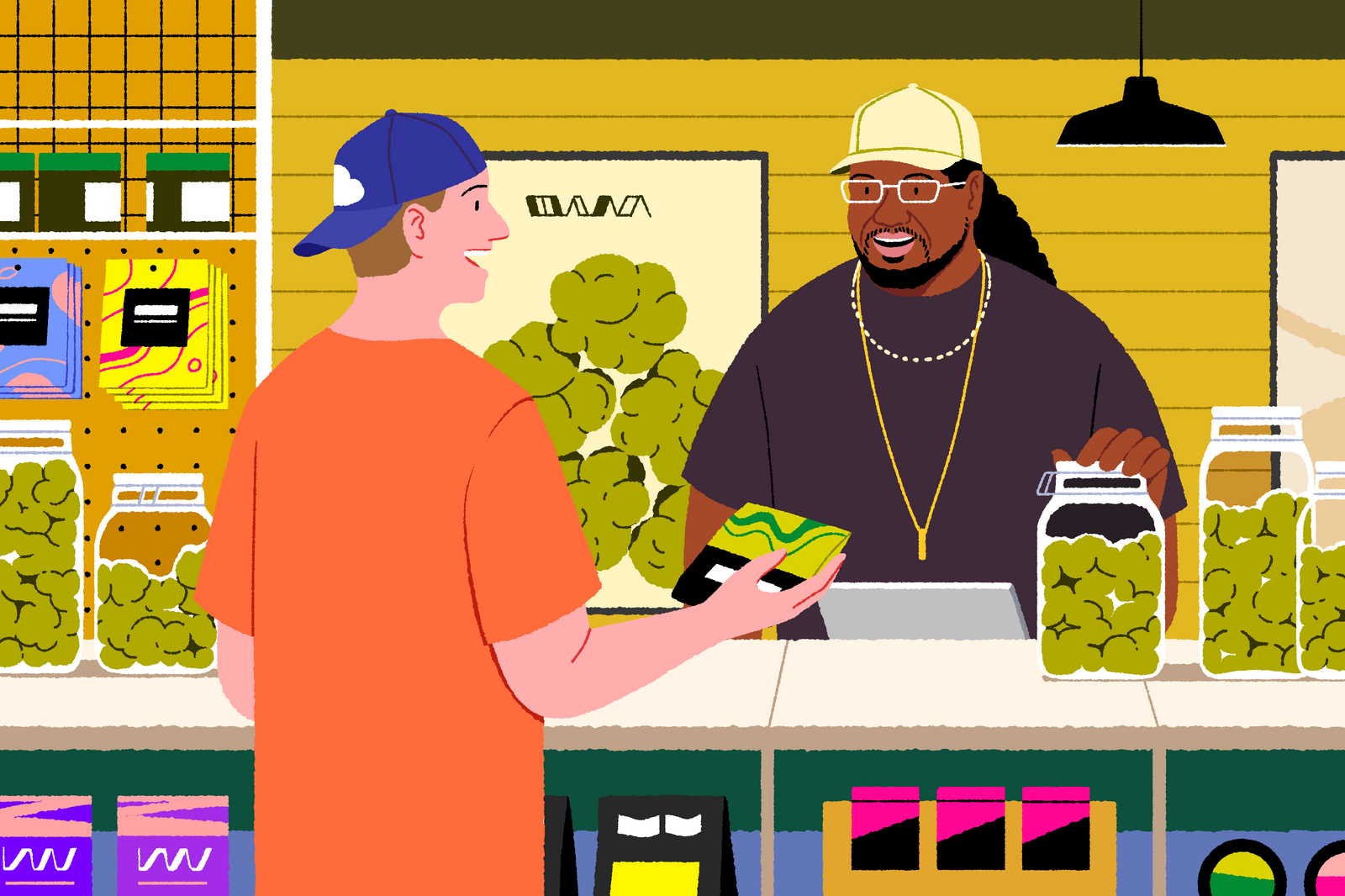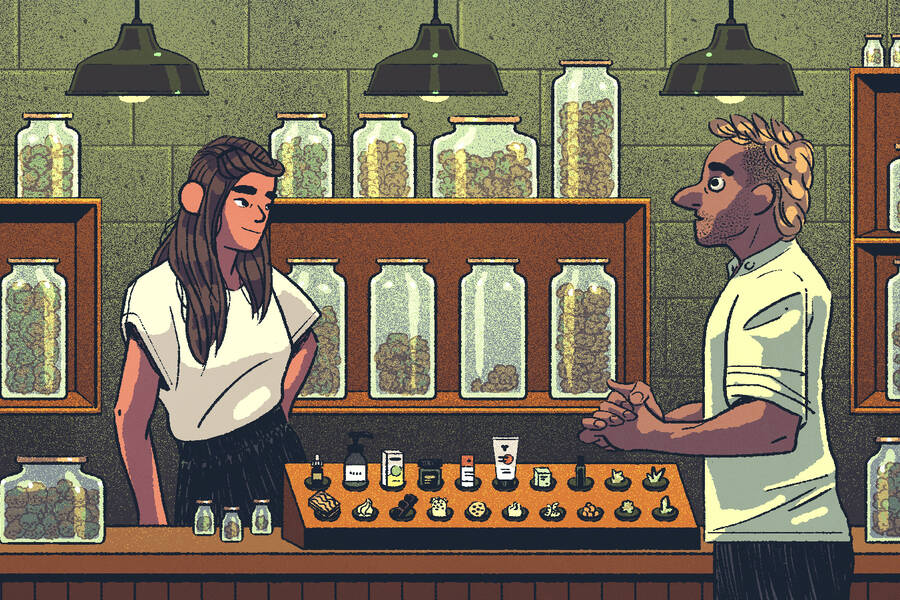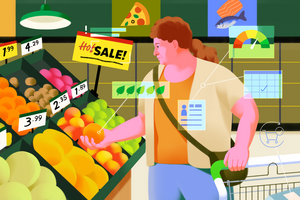Marketing Oct 1, 2025
In the Legalized Drug Industry, Stereotypes May Drive Sales
Conventional wisdom says that minority-owned branding limits your audience. That’s not the case for cannabis and psychedelics.

Yifan Wu
The U.S. market for recently legitimized drugs like cannabis and psychedelics now stretches into the tens of billions of dollars and is projected to rise exponentially.
“When those drugs became legal, it was a huge revenue opportunity,” says Chethana Achar, a Kellogg associate professor of marketing. But there have been questions about who should get access to that opportunity, given “the drug space has a very complex sociopolitical history.”
People from underrepresented communities in the U.S., for example, were disproportionately criminalized for the use and sale of cannabis and psychedelics before they were legalized. Policymakers in many states developed equity initiatives “to give these affected communities the chance to be part of the commercialization process early on by prioritizing licenses for underrepresented business owners,” Achar says.
Though the policies created more opportunities for entrepreneurs from these affected communities, particularly Black business owners, there remained questions about the effectiveness of these initiatives in the legalized drug market. Specifically, would consumers be drawn to drug products produced or sold by entrepreneurs from these communities?
To address that question, Achar, Keyaira Lock, a Kellogg MBA alumna and consultant to legalized-drug businesses, and Nidhi Agrawal of the University of Washington conducted a series of studies to determine if consumers were more or less likely to purchase legalized drugs explicitly labeled as coming from a Black-owned business.
“Most of the research on how ownership labeling affects consumer responses has been done on socially safe products like shoes and makeup,” Achar says. That research generally shows that businesses owned by Black and other historically underrepresented groups receive more support from members of those same groups than they do from other groups. Drugs, however, have more physical risk and stigma attached to them than many other products, and consumers’ responses to drug products may deviate from their responses to socially “safe” products.
Overall, the researchers found that Black ownership of cannabis and psychedelics businesses would be received favorably by consumers—in large part because of the stereotype that associates the Black community with expertise in drug-related products.
“This is one of the few cases where it appears that social stereotypes have positive market effects,” Achar says.
Mapping ownership perception
For the most part, how consumers perceive ownership labels has been largely predictable. People generally support products or services that are managed by a group that matches their own. “If it’s a woman-owned cafe, women are more likely to support it,” Achar says. “If it’s a Black-owned restaurant, Black people are more likely than others to support it.”
But support from the ingroup may break down when there are negative associations between a specific product and group of people, as might be the case between Black communities and some recently legalized drugs. “People don’t want to perpetuate a negative stereotype,” Achar says.
“This is one of the few cases where it appears that social stereotypes have positive market effects.”
—
Chethana Achar
At the same time, she says, “if a community has been historically associated with making or using a product, that could be a cue for quality based on expertise.” In other words, the historical association between the Black community and cannabis and psychedelics could create a stronger sense of legitimacy and safety for Black-owned businesses.
Based on those mechanisms, the researchers expected Black consumers to be less supportive of Black-owned drug businesses and non-Black consumers to be more supportive of them.
The nuances of support
The researchers conducted a series of studies to test their predictions.
For the first study, they surveyed Black professionals in the drug industry and found that the entrepreneurs favored indicating their race on product labels to drive support among the Black community. Most thought “Black-owned” labeling would increase purchases from Black consumers more than white consumers, regardless of whether the product was a drug.
The next study investigated possible stereotypes between common products—such as candy, footwear, cosmetics, and cannabis—and Black or women business owners. Both Black and white study participants, it turns out, perceived Black entrepreneurs as experts in cannabis. But only white participants perceived Black entrepreneurs as experts in psychedelics. Neither of these stereotypes appeared for women entrepreneurs.
In a separate study, hundreds of participants rated their likelihood of purchasing a product (either CBD gummies or regular candy) from a Black- or woman-owned business. The researchers discovered that Black participants were more likely to purchase a candy if it had a label indicating it was from a Black-owned business, compared with being from a woman-owned business or having no indication of ownershipp. But that preference disappeared for cannabis gummies marketed as Black-owned. In contrast, white participants favored CBD gummies that had a label indicating they were from a Black-owned business, but did not feel the same way about regular candy.
In a final, real-world study, the researchers ran advertising campaigns on Facebook to compare people’s interest in psychedelics. Adults on the platform saw one of three versions of an ad for psychedelics: one that said “Black-owned” on the label, one that said “woman-owned” on the label, or one that did not indicate the race or gender of the owners on the label.
Among nearly 43,000 ad impressions, the “Black-owned” ad received 21 percent more clicks than the ad that did not indicate ownership, whereas the “woman-owned” ad received 15 percent fewer clicks than the “no ownership” ad. In addition, the “Black-owned” ad was more cost-effective ($0.22 per click) than the “no ownership” ad ($0.25 per click).
When stereotypes might help
The studies collectively show that Black entrepreneurs would be well-received in the market for legalized drugs, especially among white consumers.
“Older research would suggest a Black cannabis-business owner launching in a predominantly white community not identify their race because it’s an outgroup community,” Achar says. “But our work shows that stereotypes might actually help underrepresented business owners because of the expertise association.”
More broadly, the findings illustrate the extent to which people’s stereotypes about cannabis, psychedelics, or other new products can shape the market’s reception to them.
“People seem to have these stereotypes about who’s good at doing what, regardless of whether it’s correct,” Achar says. “And they expect an owner’s expertise to line up with that stereotype. If it doesn’t, the brand gets punished, like, ‘You should not be making this.’”
Sachin Waikar is a freelance writer based in Evanston, Illinois.
Achar, Chethana, Nidhi Agrawal, and Keyaira Lock. 2025. “From Stigma to Support: ‘Black-Owned’ Labels and Expertise Stereotypes in Cannabis and Psychedelics Markets. Journal of Consumer Research.



